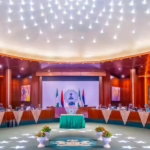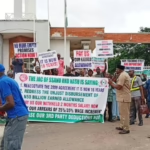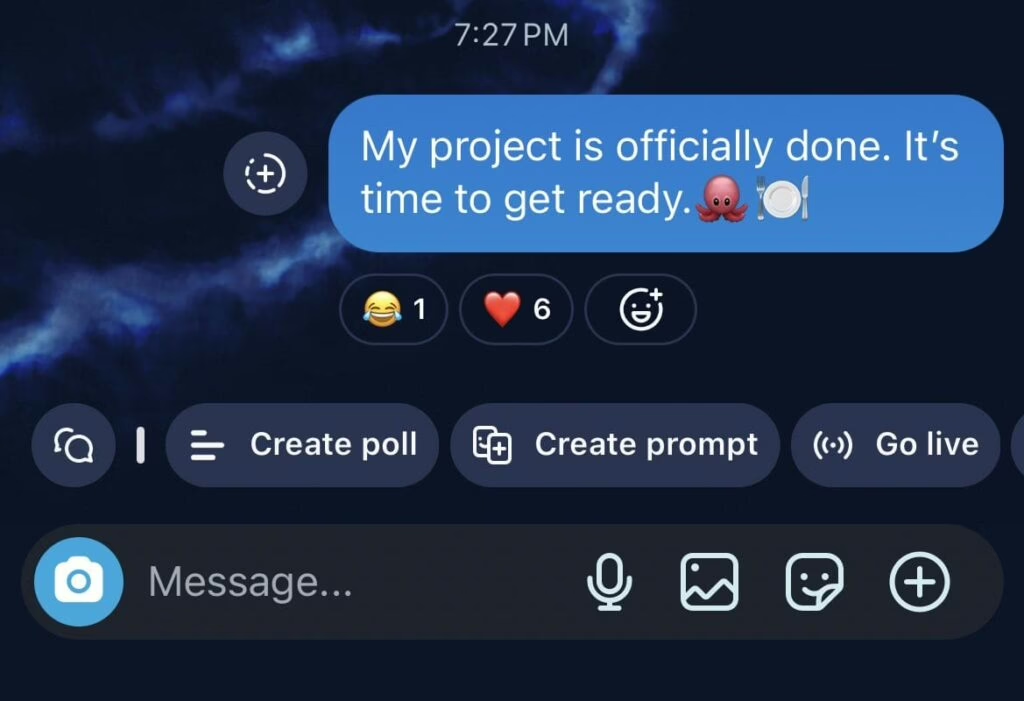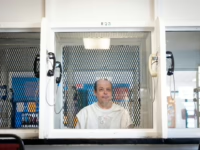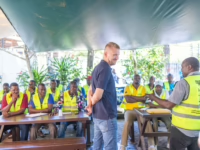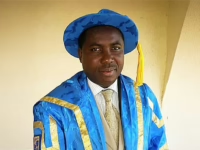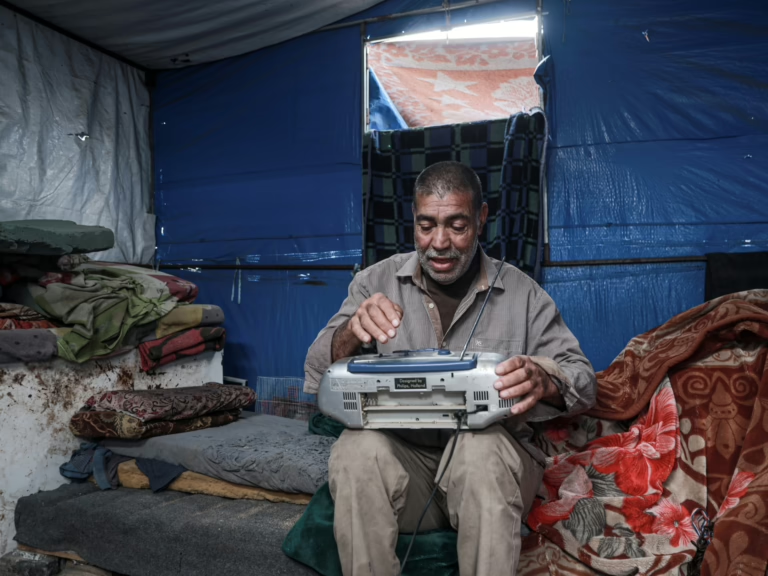Deir el-Balah, Gaza – A tentative sense of hope lingers in the heart of Gaza’s Deir el-Balah as residents gather outside their makeshift shelters, exchanging thoughts about the impending ceasefire awaiting approval from the Israeli cabinet.
While some embrace this pause with cautious celebration, others remain skeptical, fearing it may be as fleeting and fragile as previous ceasefires that were broken by Israel.
Promoted by U.S. President Donald Trump as a potential breakthrough in the Israel-Palestine conflict, this ceasefire is expected to halt Israeli airstrikes on Gaza 24 hours after cabinet endorsement, with discussions scheduled for Thursday.
Anticipation Mixed with Skepticism
Inside a humble shelter constructed from plastic sheets and blue tarps, 62-year-old Nasser al-Qernawi clutches his radio, a constant companion over the past two years. The latest broadcast has left him both hopeful and uncertain.
“The morning news was grim yesterday, but now it feels different,” he reflected. “Netanyahu didn’t mention ‘peace’-others did, but not him. So, we’re unsure of his true intentions. Still, I believe he might accept it… if Trump signs it, then it’s done.”
Many here pin their hopes on Trump’s diplomatic influence, often contrasting it with deep mistrust toward Israeli Prime Minister Benjamin Netanyahu.
“I’m about 90 percent doubtful,” said Khamis Othman, displaced from Bureij camp. “Netanyahu is a deceiver. He sees this as a strategic move to further his agenda. They might seize what they want and then strike us again.”
Earlier this year, Hamas released 33 Israeli and five Thai detainees as part of a israel-next-middle-east-target/” title=”Could Turkiye Be …'s Next Focus in the Middle East? | Conflict News”>ceasefire agreement. Yet, Israel breached the truce in mid-March, reigniting its devastating assault on Gaza.
“If they truly valued their captives,” Othman added, “they wouldn’t have targeted them alongside resistance fighters.”
Despite his doubts, Othman remains cautiously optimistic: “From what we’ve heard, the ceasefire should begin Friday. Hopefully, it will.”
Displacement and the Pain of Loss
Ilham al-Zaanin, known as Umm Mahdi, 60, has been uprooted along with her five children and ten grandchildren since the conflict escalated. Her emotions are conflicted-relieved at the prospect of peace, yet grieving the loss of her home.
Her family hails from Beit Hanoon in northern Gaza, an area that will remain under Israeli military control during the initial ceasefire phase, forcing them to stay displaced indefinitely.
“During the January truce, we returned to our house in Beit Hanoon,” Umm Mahdi recounted. “But everything was destroyed. We had no choice but to come back here and live with my husband’s relatives.”
“The devastation is overwhelming. Everyone carries their own pain… truly, we are suffering,” she added with sorrow.
Her cousin, Itidal al-Zaanin (Umm Mohammad), echoed this despair, highlighting the toll on younger generations.
“Instead of dreaming about their futures or playing, my grandchildren carry knives and haul heavy water containers to sell,” she said. “They tell me about the remains they find after attacks-‘Grandma, we found bodies in pieces,’ they say.”
“Soon, the true scale of martyrs, the injured, and those trapped beneath rubble will shock us all,” Umm Mahdi warned.
“Over these two years, I have witnessed unimaginable horrors-mass killings, death convoys, carts carrying the deceased,” she lamented.
Balancing Hope with Wariness
Everyone interviewed expressed relief that the violence might cease, offering a chance for some to return to what remains of their homes.
Yet, Othman remains guarded: “We hear promises repeatedly, but they often fall apart. Optimism hides in the shadows.”
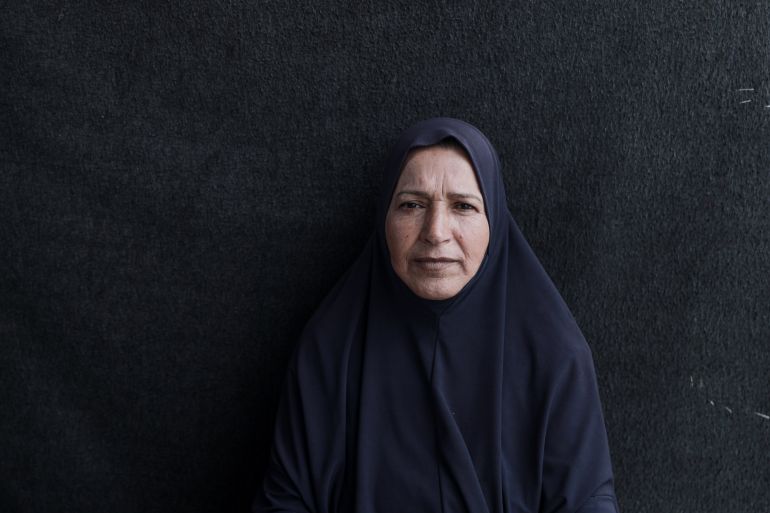
Umm Mahdi shares this cautious stance: “[Israel] cannot be trusted. Look at Lebanon-they bomb there daily. We hope mediators will step in to protect us.”
Even if the ceasefire holds, Umm Mohammad doubts life will ever return to normal.
“My sisters lost their children, our homes lie in ruins. Our future feels shattered. There’s no real joy, but at least the bloodshed has paused,” she said.
“For two years, we’ve pleaded with Arab nations, foreign governments, and fellow Muslims, but no one heeded our cries or those of our children-children who witnessed bodies torn apart near Al-Aqsa Hospital, children who became martyrs.”
Meanwhile, al-Qernawi clings to his hope as tightly as he does his radio, which has been a source of connection and comfort throughout the relentless conflict.
“Sometimes my daughters and neighbors gather to listen with me,” he shared. “God willing, people will return home. God willing, this war will end.”
“The entire purpose of restarting the war was displacement. But now, that opportunity has passed.”


